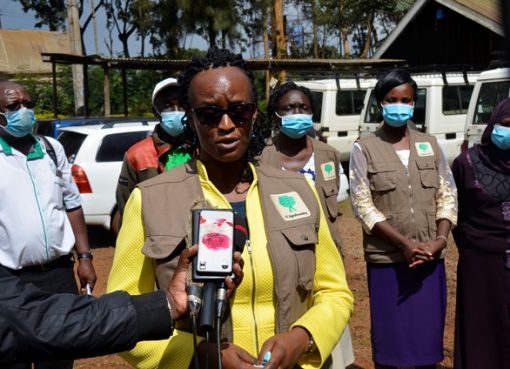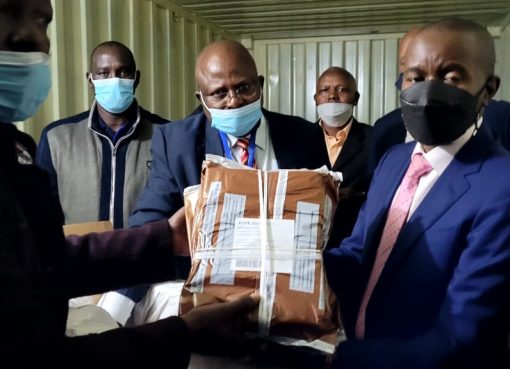The government has directed ranchers in Taita-Taveta County to provide details of herders currently grazing in the ranches as security agencies scale up operation to implement a comprehensive program to weed out criminal elements and illegal herders from the region.
County Commissioner Rhoda Onyancha said ranch-owners were duty-bound to provide particulars and other necessary information about herders and their employees to help in monitoring and thwarting potential criminal activities.
Speaking in Mwatate during a meeting with directors of Taita-Taveta Wildlife Conservancy Association (TTWCA) Tuesday, the county commissioner expressed her concerns that nearly all ranchers lacked proper systems to document the details of herders within their ranches.
“We need to know who is in our ranches and who his employees are. Such details will be helpful to enhance security in and outside the ranches because we will know we are not housing criminals,” she said.
The association is an umbrella body that brings together over 28 ranches and occupy a approximately 1.4 million acres.
In a pointer that the government will intensify a crackdown against illegal herders, the administrator said once the information is available, livestock owners will be required to promptly report to the authorities whenever any of their employees quit and a replacement is hired.
The county commissioner insisted that this would allow the government to maintain an updated database of herders, other workers and individuals living in the ranches.
TTWCA chairperson Bon’gosa Mcharo said ranchers were willing and ready to comply with the directive that would bring sanity into a sector that was reeling from invasion by illegal herders.
He added that for many years, the ranchers had watched helplessly as droves of herders with thousands of animals moved into their ranches in search of pasture and water. He pointed out that majority of the local ranches had been reduced to bare land by the herds.
“We are pledging to provide a list of all tenants and herders who are in our ranches. We are hopeful this will help us get rid of this perennial problem,” he said.
The ranchers further promised to provide copies of lease agreements entered into with the herders. The leases would be used as basis of identifying illegal herders.
Mcharo admitted that a few ranches had valid leases with cattle owners to graze within them but denied the existence of any agreement between any of his member ranches with camel herders.
“None of my members has any agreement with camel owners. The animals are in the ranches illegally,” he said.
The current measures come in the wake of a tragic incident at Kirumbi village in Sagalla where a farmer, Alex Mlambo, was fatally stabbed by a camel herder on Thursday last week.
The herder fled and is still being sought by the police. The incident angered the local residents who avenged by killing dozens of camels. Leaders in the region rapidly moved in and pacified the situation with police arresting five suspects over the murder.
Mr. Mohamed Ibrahim, the camel owner, claimed that the murder suspect had only worked for a week before he committed the heinous crime.
Governor Granton Samboja stated that his administration would not allow haphazard movement of livestock into the county from other region. He stated that all leases entered to by individual farmers with herders would not be recognized by the county government if they violated the law.
“All leases between individuals and herders must be declared null and void. There must be regulation and order in livestock sector,” he said.
Even as calm returned, the government continues to monitor the situation with the Coast Regional Commissioner (RC) John Elung’ata and top security officials in the county visiting the widow of the slain farmer and assuring her she would get justice.
Later Elung’ata held a meeting with security heads where the area Member of County Assembly (MCA) Godwin Kilele was invited.
There are claims that three people have been killed in Teri B group ranch in the last six years by suspected rogue herders following row over grazing land.
There was a similar conflict between herders and farmers at Mariwenyi area in 2011.
Ms. Onyancha said that such confrontation would end once the County Ranching and Livestock Policy was enacted into law to enhance the control of the influx of livestock into the region. Noting that livestock regulation was a devolved function, she stated security organs were ready to assist the county enforcement team to deal with illegal herders.
“With the policy in place, such issues as illegal herders will be easily handled,” she said.
Amongst the requirements the ranches will also be required to submit to the authorities holding capacity, possible environmental impacts and mitigation measures.
She however blamed ranches for entering blindly into agreements with herders without scrutinizing their contents and advising them to invest in livestock scouts who would ensure all boundaries were secure.
On their part, the ranchers complained that a section of illegal herders had stubbornly refused to drive their animals away even after being asked to do so.
Mr. Kirute Mjomba,a director at Mbale Ranch and a treasurer of TTWCA, reported that a tenant in the ranch had declined to provide information about the number of workers he had despite being requested to do so several times.
“We don’t know how many workers he has because he refused to respond or honor our summons,” said the director.
The County Commissioner stated that the boards of ranches had powers to summon a tenant should they find any clause in the lease agreement had been violated.
By Wagema Mwangi




